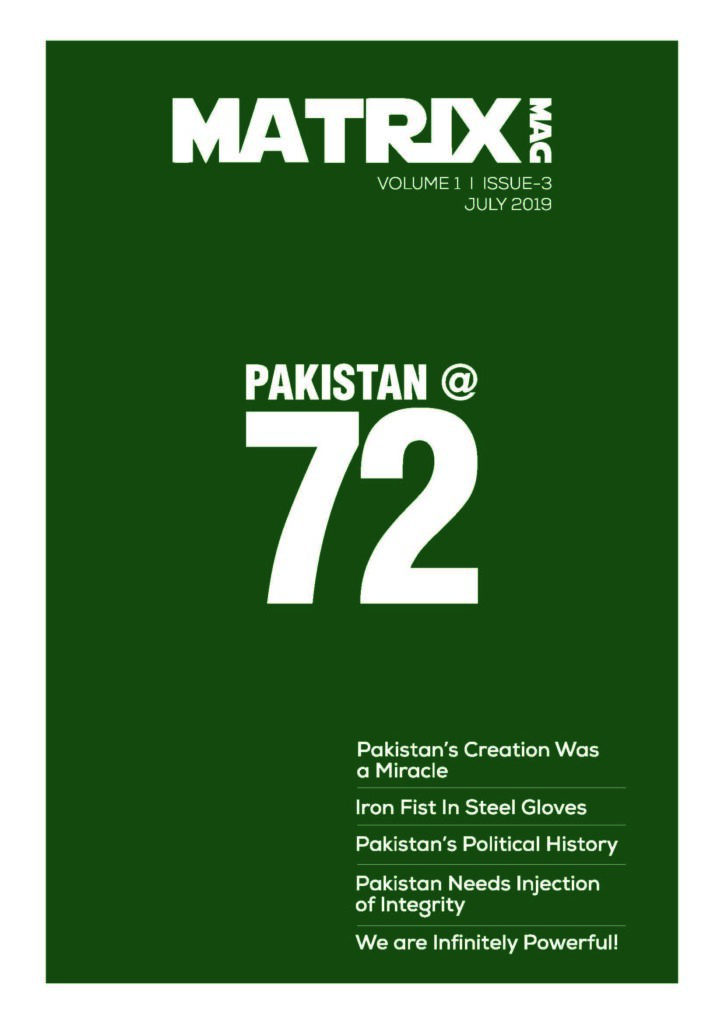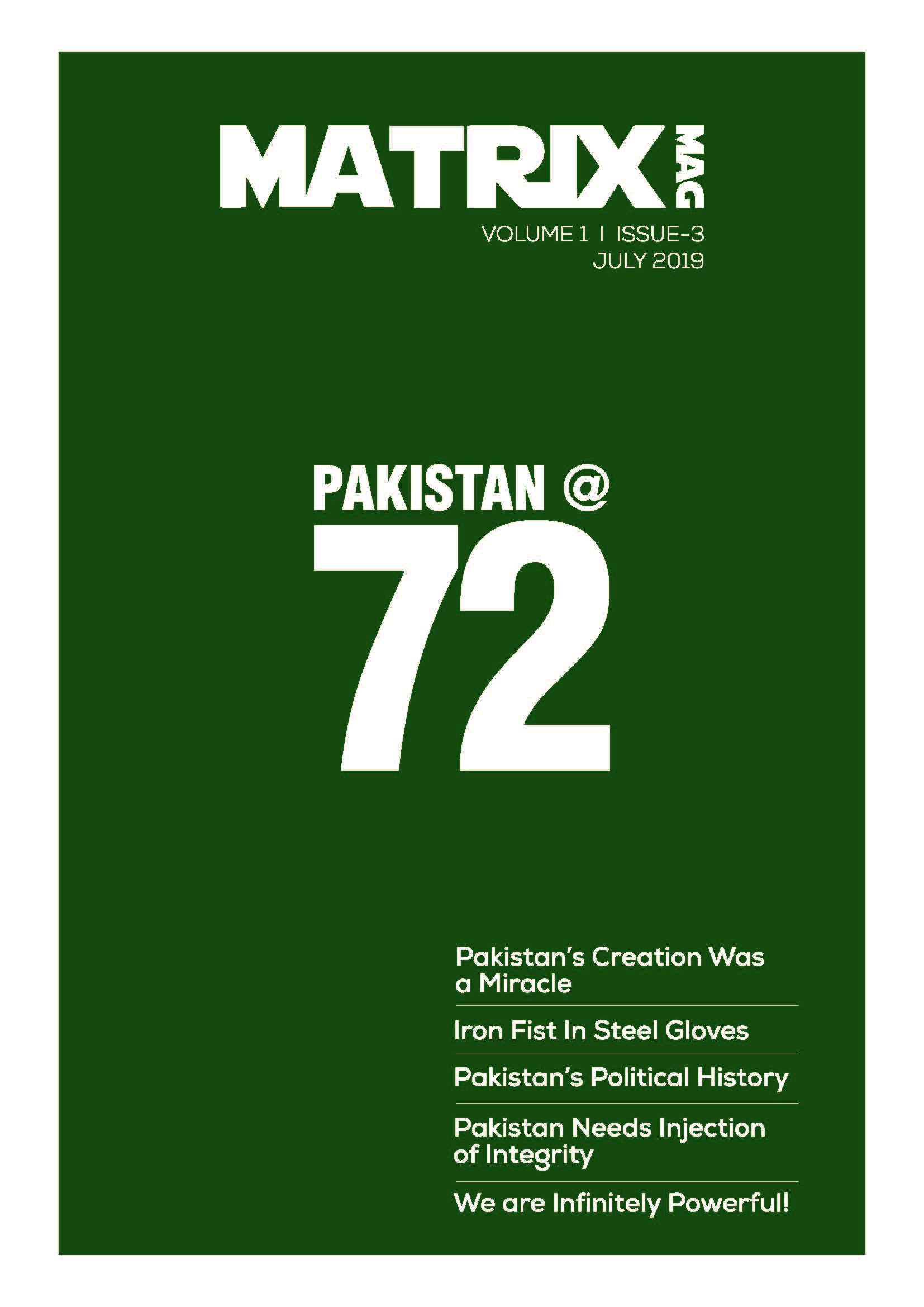Dr. Syed Nazir Gilani
The two UN Reports, of 14 June 2018 and 8 July 2019 on the Human Rights situation in Jammu and Kashmir, are leap steps taken by the Office of UN High Commissioner for Human Rights. The reports have resolved two basic issues of interpretation of “Administered Territories” and “Self-Determination”.
The reports have defined Indian-Administered Kashmir as consisting of the Kashmir valley, the Jammu and Ladakh regions and Pakistan Administered Kashmir as comprising of the “two administrative regions – Azad Jammu and Kashmir (AJK) and Gilgit-Baltistan (G-B). In recommendations 19 and 10 July 2019 report has asked India and Pakistan to “Fully respect the right of self-determination of the people of Kashmir as protected under international law”.

Download Matrix Mag July Issue here
The draft report was sent to Government of India and Government of Pakistan on 12 June 2019 to “provide any factual comments by 17 June”. Foreign Office of the Government of Pakistan could not spot that the report has addressed the Indian-Administered Kashmir as “Indian State of Jammu and Kashmir” 8 times in paragraphs 4, 6, 9, 18, 46, 52, 70 and 132.
The report has qualified the manner of its interest as ‘serious’ in India and as ‘significant’ in Pakistan. In Pakistan-Administered Kashmir the human rights violations have been considered far distinct from violations in Indian-Administered Kashmir. These have been described as of ‘structural and legal’ in nature. India carries the blame of “serious human rights violations and patterns of impunity.” (Paragraph 181 of July 8, 2019 Report).
Government of India has suffered a serious loss of respect at the Human Rights Council and around the world. India remains on the Human Rights Council until 2021 and Pakistan keeps its membership until 2020. Indian allegation that the OHCHR June 2018 report was “false and motivated” and further accusation that the Special Rapporteurs had “individual prejudices” against India, could not help the member nation of UN to undo the massive evidence brought against its human rights record in Kashmir.

Download Matrix Mag July Issue here
Indian stand on the report and on the questionnaire of Special Rapporteurs has no merit. The report is based on “reasonable grounds” test and all the sources used are Indian. It has used the official Indian sources, like, information obtained under Right to Information Act, Parliamentary questions in the Indian Parliament, Indian court orders, police reports, reports of the Press Trust of India, J & K Human Rights Commission, National Human Rights Commission of India, research of local, national and international NGOs, and a “smaller number of interviews to corroborate information.”
The massive spread of evidence of the gross and systematic violation of human rights in Kashmir valley does not support the Indian stand that the report is “false and motivated” and that UN Special Rapporteurs had any “individual prejudices” against India. In fact OHCHR June 2018 report did not have the benefit of the testimony of Yashwant Sinha a senior Indian politician and head of a civil society organization – Concerned Citizens Group, which he gave on 26 December 2018 after his visit to Kashmir. He has said that “Modi Government had abandoned the Vajpayee policy of ‘Consensus, Democracy and Insaniyat’, in favour of a “Strong State Policy” in Kashmir, “which meant the use of brutal force to kill as many as they could.”
Three JKCHR documents titled “Jammu and Kashmir – Freedom of opinion and expression”, Jammu and Kashmir–Merits of Indian refusal to respond to UN Special Rapporteur and “India-Danger of normalising racism, xenophobia, intolerance and all forms of bigotry,” released as UN GA documents under agenda items 3, 4 and 9 at the 41st session of UN Human Rights Council in Geneva further add to the evidence secured by the United Nation about the disturbing human rights situation in the Indian administered Kashmir.
India should not be judged by how close it stands to the world’s most powerful countries, but how much the State extends itself to the most vulnerable within its own boundaries. The report is a sad commentary on the situation in the Indian administered Kashmir. People have been disenfranchised. Government of India played foul with the elected leadership of Kashmir and engineered a dissolution of the Assembly in June 2018.
Governor’s office fax was deliberately switched off on 21 November 2018, so that Mehbooba Mufti could not serve the notice of her ability for formation of a Government in alliance with National Conference and Congress to the Governor. Delhi has perfected its master plan of deceits in its administered part of Kashmir.
Indian Government wanted to use the Governors rule (and now the Presidents rule) to push through some laws, which an elected legislature would have debated and refused. Indian Government does seem to have many plans, in particular, the plan to tamper with laws to allow a change in the demography is dangerous.
The most sinister thing that has been highlighted (missed out by all Kashmiris) in the 8 July 2019 UN report is the amendment made through Governor’s order in the Section 10 of Jammu and Kashmir Public Safety Act. Section 10 of the PSA would not allow permanent residents of the state to be lodged in jails outside the state. Soon after dissolution of the Assembly Governor Vohra issued the new law on 13 July, 2018, under which the citizens of Jammu and Kashmir have lost this protection and are now lodged outside the State in various prisons of India.
The orders of detention are issued by the deputy commissioners rather than the courts and despite the high court revoking the PSA orders in the case of many prisoners, they are being again booked under the Act through an “administrative order”. The detention under PSA is renewed with a new administrative order after every release by the Court. This has helped the administration to slap 37 detention orders on Musarat Alam.
From Para 89 of the UN updated report we find that even the Kashmiri Government based at Srinagar has betrayed its own people and has violated the oath of doing ‘good to all manner of people’. It has been revealed that “while the PSA Advisory Board confirmed almost 99 percent of the detention orders, the Jammu and Kashmir High Court reversed over 81 percent of these detention orders. In May 2018, the State Government further diluted the checks and balances in the application of the PSA by removing the need to consult Jammu and Kashmir High Court Chief Justice while constituting the Advisory Board”. Mehbooba Mufti headed the alliance Government in May 2018. She resigned on 19 June 2018. She has acted against the Kashmiri traditions and remains an accomplice in the use of PSA, which has caused enormous indignity and suffering.
Human Rights Council has been asked by NGOs in special consultative status with the UN, to take note that Indian army has been admitted on certain conditions. It is a sub ordinate army and a supplement to the State forces. United Nations has placed restraints on their number, behaviour and location. Assurances of their good behaviour have been given at the UN Security Council and the most prevailing assurance was that these Indian security forces would be under the watchful eye of the UN Commission. We have UNMOGIP supervising the cease fire line but the UN Commission supposed to watch these forces, was never allowed to assume its role.
JKCHR has been working on the four components of Kashmir case, namely, ‘rights and dignity’ and ‘security and self-determination’. For the last 4 years the NGO has been focussing on demilitarization and the use of UN force in Kashmir as first proposed by Pakistan at the 761st meeting of UN SC on 16 January 1957. The proposal was carried forward by Australia, Cuba, United Kingdom and Northern Ireland and United States of America in their joint Resolution S/3787 moved on 14 February 1957 at the UN SC. On 30 September 2015 at the 70th session of UN General Assembly Pakistan has reiterated its proposal for a demilitarization in Kashmir.
No army has ever vanquished a people aspiring to be treated as ‘equal’ and to exercise their right of self-determination. Indian army could not be an exception in Jammu and Kashmir. Both UN report of June 2018 and July 2019 ask India and Pakistan to “Fully respect the right of self-determination of the people of Kashmir as protected under international law”. The quicker, the better.
The author is President of London based Jammu and Kashmir Council for Human Rights – NGO in Special Consultative Status with the United Nations.




